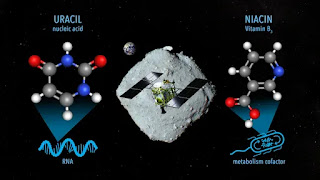A conceptual representation of the asteroid Ryugu sampling conducted by the Hayabusa2 space probe, with the uracil molecule depicted on the left, and the niacin molecule, better known as vitamin B3, on the right. Credits: NASA Goddard/JAXA/Dan Gallagher.
Unearthing the Building Blocks of Life on Asteroid Ryugu
A recent study published in the esteemed journal "Nature Communications" has piqued the interest of scientists and space enthusiasts alike. Led by Professor Yasuhiro Oba from Hokkaido University in Japan, a team of researchers announced the groundbreaking discovery of uracil molecules on the asteroid Ryugu. This fascinating find was made possible by samples collected by the Japanese Space Agency's (JAXA) Hayabusa2 spacecraft at the end of 2020.
The Crucial Role of Uracil and Vitamin B3 in Life's Development
Uracil is one of the nitrogenous bases that constitute ribonucleic acid (RNA), a vital component in the process of converting genetic information from deoxyribonucleic acid (DNA) into proteins. This makes uracil an essential building block for life as we know it. Additionally, the samples from Ryugu also revealed the presence of vitamin B3 (niacin) and other nitrogen-containing organic compounds. Vitamin B3 plays a critical role in metabolism, making it another vital ingredient for life.
Overcoming Contamination Concerns in Extraterrestrial Samples
Previous discoveries of nitrogenous bases and vitamins on extraterrestrial rocks have been met with skepticism, as contamination concerns arose due to the samples' exposure to Earth's environment. However, the samples collected from Ryugu arrived at the laboratory within sealed capsules, eliminating the issue of contamination. This strengthens the hypothesis that life's essential constituents may have been delivered to our planet via asteroids.
The Potential for More Life-Supporting Compounds on Ryugu
The presence of uracil on Ryugu leads researchers to speculate that other fundamental compounds necessary for life may also be present on the asteroid. However, the detection of these compounds has been limited by the small sample size collected by Hayabusa2 (almost five and a half grams of dust). Future missions and technological advancements in laboratory analysis could potentially uncover more life-supporting compounds on Ryugu and other celestial bodies.
In conclusion, the discovery of uracil and vitamin B3 on the asteroid Ryugu is a significant step forward in understanding the origins of life on Earth. This finding supports the theory that life's essential building blocks were delivered to our planet by celestial objects like asteroids. As technology continues to advance, further exploration of these celestial bodies could unlock more secrets about the origins of life and the potential for extraterrestrial life forms.


Post a Comment